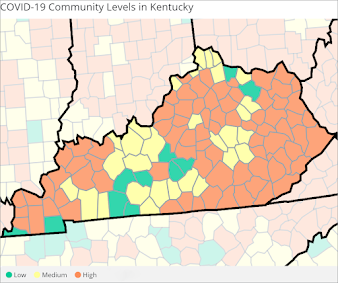CDC eases some Covid-19 guidelines, says 89 Ky. counties are at high risk of Covid-19; state’s infection rate is highest in U.S.

CDC map estimates ranges of risk for contracting Covid-19.
—–
By Melissa Patrick
Kentucky Health News
As the Centers for Disease Control and Prevention loosened some of its Covid-19 recommendations, even more Kentucky counties moved into the high-risk category for coronavirus transmission on the CDC’s weekly risk map.
And The New York Times reports that Kentucky has the highest infection rate among the states.
The number of Kentucky counties in the high-risk category, orange on the CDC map, increased to 89, from 80 in last Thursday’s report. The number of yellow counties, indicating a medium risk of Covid-19, dropped to 20, down from 31.
The good news is that for the second week in a row, the state still has green counties on the map, indicating a low risk of Covid-19 transmission. The number of low-risk counties increased by two, to 11: Fulton, Calloway, Simpson, Logan, Butler, Edmonson, Green, Taylor, LaRue, Fleming and Bracken.
In the high-risk counties, the CDC recommends that you wear a well-fitting mask in public indoor spaces, and if you are at high risk of getting very sick, consider avoiding non-essential indoor activities in public where you could be exposed. If you live in a medium or high-risk county, the CDC advises wearing a well-fitting mask when indoors and in public and to consider getting tested before having social contact with someone at high risk for getting very sick and consider wearing a mask when indoors when you are with them.
The CDC’s new guidance says people who are exposed to the virus no longer need to quarantine at home, regardless of vaccination status, although they should wear a high-quality mask for 10 days and get tested on day five. It also not longer recommends routine surveillance testing for people without symptoms and says contact-tracing is only necessary in health care settings or high-risk congregate settings.
Masks continue to be recommended only in areas where community transmission is high, or if a person is at high risk of severe illness. The CDC publishes maps showing the level of community transmission in each county; all Kentucky counties but four (Hickman, Lyon, Todd and Metcalfe) have high levels.
One CDC recommendation that remains the same is that people with Covid-19 should isolate for at least five days as long as they are without a fever for 24 hours without the use of fever-reducing medication and all other symptoms have improved. They should then wear a mask through day 10, or test negative twice over 48 hours before they stop wearing a mask.
He added, “Everybody now has all the information on how Covid spreads, what you can do to stop it. Please try to make the best decisions for you knowing that at this point, we all know how this thing works and how we can protect ourselves.”
The data shows that the pandemic is clearly not over, even though 31.7% of Kentuckians think it is, and 53% of them say it is over for them, according to a Foundation for a Healthy Kentucky poll taken June 4-July 13.
Asked what can be done to persuade Kentuckians that the pandemic is not over, Beshear said Kentuckians are tired of it, and of wearing masks, then said the most important thing we can do is to get more people vaccinated and boosted. He also said Kentucky will keep sharing pandemic information with Kentuckians even as other states quit.
He said that at this point in the pandemic, Kentuckians need to recognize that they will just need to change their behaviors, like wearing masks, for a few weeks at a time, instead of forever.
Beshear spoke as the CDC was relaxing its guidance, while sharing a similar message as the governor.
“We’re in a stronger place today as a nation, with more tools—like vaccination, boosters, and treatments—to protect ourselves and our communities, from severe illness from Covid-19,” CDC epidemiologist Greta Massetti said in a news release. “We also have a better understanding of how to protect people from being exposed to the virus, like wearing high-quality masks, testing, and improved ventilation. This guidance acknowledges that the pandemic is not over, but also helps us move to a point where Covid-19 no longer severely disrupts our daily lives.”
